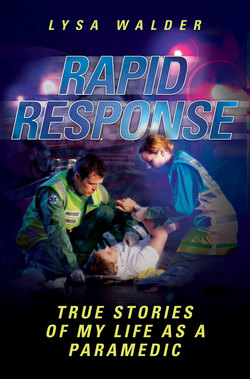Читать книгу Fighting For Your Life - Lysa Walder - Страница 4
На сайте Литреса книга снята с продажи.
FOREWORD
ОглавлениеIf you live in the capital, you’re aware of them all the time. They are the noisy ambulance sirens, the helicopters whirring above your home at 3am, the speeding police cars and clamouring fire engines racing through the traffic and down the clogged city streets to the next emergency, the next drama.
The sound and fury of London’s emergency services might irritate or annoy the frustrated motorist, the pedestrian trying to talk into their mobile or the edgy sleeper, wakeful at any hour. But this background chorus, strident as it is, is an omnipresent soundtrack of inner-city life, as familiar a sound in London as the sight of red buses, nose to tail in Oxford Street, or black taxis crawling up and down Shaftesbury Avenue.
But what lies behind it all, behind the thousands of 999 calls made every day in London, home to 7.5 million people, a city that never sleeps? What happens when ambulance emergency crews turn up at an incident only to encounter injury, mayhem, danger, madness and, in a few cases, tragedy? Who are the people whose job involves walking down the city’s streets, night and day, tending to the victims of crime or sudden illness? And what sort of dangers do they face as they go about the business of responding to the emergency calls?
Over the course of a four-year period, as a feature writer for the London Evening Standard, I interviewed many people working at all levels for our public services – and Lysa Walder was one of them. I talked to doctors, nurses, A&E staff, police officers and emergency teams. These are people whose daily toil involves dealing with the consequences of illness, alcohol, drug addiction, crime and disaster – sometimes facing the very extremes of human behaviour in an unpredictable working life where anything can happen, at any hour of the day or night, in and around London’s teeming streets and suburbs.
These are the people that mop up the blood, pick up the pieces, soothe the scared or terrified and, on a good day, save lives that would surely have been lost without their input and speed of response.
I’m a fully paid-up cynic but to say these London emergency workers like Lysa are impressive in their dedication to the job, their professionalism and, significantly, their modesty about the crucial role they play in the life of the city, is not an exaggeration. Lysa, like so many of her breed, insists that there’s no time for individual heroics in the world of 999 and emergency services. Only groupings of fire, police, ambulance, helicopter and medical teams who know that the team work itself is what makes the service work efficiently, not individual acts. A nurse, paramedic, mum-of-three and Londoner, Lysa typifies to me what the ambulance service is all about – down-to-earth, professional, highly trained, caring people who get behind the wheel and get on with the job, no matter what it may involve. And in the combat zone that some of our meaner streets make up, they deploy fast response, humour and a skilled but very human approach to a job that most of us would baulk at.
Lysa’s stories include that of the woman whose husband tried to slaughter her, the baby condemned to a life of abuse, the young life that lay bleeding, trickling away from a senseless knife wound on a south London street. Her voice comes directly from the frontline – and the heart. What she tells us about the day-to-day work of London’s amazing free ambulance service – the biggest and busiest such service in the world – may be scary, shocking, sad, thought-provoking or downright funny but it also tells us a lot about human nature and ourselves, wherever we live.
But if Lysa’s stories are a form of acknowledgement of the work of London’s ambulance service, it must be said that recognition for the high standards and dedication to the job should be made equally to all NHS and St John Ambulance emergency crews up and down the country.
It’s a tough job at times but you do us proud. You cope, unflinchingly, with fear, pain, shock, death and out-of-control behaviour, and put your own lives on the line. And you usually do it with a smile and a joke. Thank you, every single one of you. You insist you’re not heroes. But to many of us, that’s what you are.
Jacky Hyams, London, 2011
